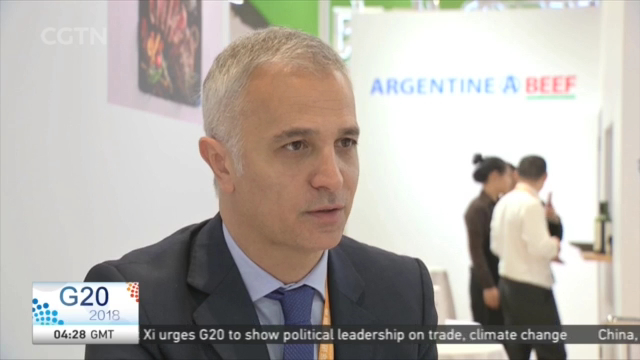
13:15, 02-Dec-2018
G20 Summit: Rising opportunities for Argentine beef amid China-US trade war
Updated
12:13, 05-Dec-2018
03:09

With the G20 Summit in Buenos Aires coming to a close, Xi Jinping is taking the opportunity to pay Argentina a state visit. His first trip to the country was more than 4 years ago. Bilateral ties have boomed since then, with China becoming the number one export destination for Argentina's agro sector, and its second-largest trading partner overall. The country's beef, in particular, is enjoying rising popularity in China. CGTN's Han Peng tells us why.
Fresh from the other side of the world. For many Chinese, this sizzling Argentine beef is more than just a Western dish. It represents the fanciness of some Western delicacies.
HAN PENG SHANGHAI "It's interesting that while many of the Chinese people are still learning the Western table etiquette of how to eat a steak properly, a lot of foreign importers are already learning to introduce their foreign beef into the Chinese cuisine."
SERGIO GUSTAVO REY ARGENTINE BEEF PROMOTION INSTITUTE "We are producing recipe videos on WeChat. Something we realized is that the Chinese consumers, even if they like to try new products, they appreciate a lot their own cuisine."
China is now the world's biggest beef consumption market. But this Argentine beef exporter says, to stand out in the competitive Chinese market, smart online advertising alone is far from enough.
HUGO A. BORRELL, GENERAL MANAGER ARRE BEEF "We are working together with the importers from China to develop the e-commerce and the chains to try to find a way with the long transit time that we have from Argentina to China."
Chinese e-commerce giants like Alibaba are building up long and expensive refrigeration chains to help with fresh meat imports.
CHEN REN MARKETING DIRECTOR WIN-CHAIN "So when we talk about freshness of the products, we have cold chain logistics partners who work through the whole process to bring the products all the way to China. And also we'll have channels in the whole ecosystem, like the major retail channels T-Mall supermarket, selling and marketing the products to the Chinese consumers."
But notably absent in China's global spending spree is the United States. Last year, China lifted a ban on US beef imports, a move to ease the trade tensions with the Trump administration. But in July, when Washington slapped tariffs on Chinese goods, Beijing fought back by targeting US agricultural products, including beef. The general manager of one of Shanghai's largest food companies described his company's response.
XU WEI, GENERAL MANAGER SHANGHAI NEW SOURCE INTERNATIONAL TRADING COMPANY "Total taxes on US beef sold in China rose from just over 20 percent to a staggering 52 percent. We have sharply reduced US beef imports, and turned to other partners instead."
He says it's not hard to replace US beef with that from Europe, Australia and, of course, Argentina. The trade war may have caused little change at the Chinese dinner table, but it is rearranging the place settings for global business. Han Peng, CGTN, Shanghai.

SITEMAP
Copyright © 2018 CGTN. Beijing ICP prepared NO.16065310-3
Copyright © 2018 CGTN. Beijing ICP prepared NO.16065310-3